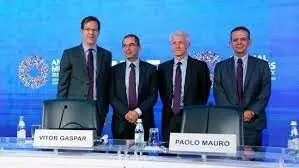
IMF's Deputy Director says there is a lot to learn from India
text_fieldsMumbai: The International Monetary Fund's Deputy Director of the Fiscal Affairs Department, Paolo Mauro, has applauded India's digitalised banking system and various social welfare schemes, calling it a 'logical marvel'.
"From India, there is a lot to learn. There is a lot to learn from some other examples around the world. We have examples from pretty much every continent and every level of income. If I look at the case of India, it is actually quite impressive," Paolo Mauro, Deputy Director of the Fiscal Affairs Department at the IMF, told reporters at a news conference in Washington.
"In fact, just because of the sheer size of the country, it is a logical marvel how these programmes that seek to help people who are at low-income levels reach literally hundreds of millions of people," he said in response to a question on the impressive direct cash transfer programme being successfully implemented by the Indian government.
There are programmes that target specifically women. There are programmes that target the elderly and farmers. Perhaps the interesting part is that in these examples, there is a lot of technological innovation, he said.
"In the case of India, one thing that is striking is the use of the unique identification system, the Aadhaar," Mauro said.
"But in other countries, also, there is greater use of sending money through mobile banking to people who actually do not have a whole lot of money, but they have a cell phone," Mauro said.
"So being somewhat innovative in identifying people, in processing their applications for transfers through digital means, deploying funds through, again, mobile banking. This is something that countries can learn from each other. We try also here to be a little bit of a convening place where people can compare these types of experiences," he said.
Observing that the IMF is collaborating with India on the application of new technologies, Vitor Gaspar, Director of the Fiscal Affairs Department, said that India is "one of the most inspiring examples of the application of technology to solve very complicated issues of targeting support to the people who need it most".
The IMF has also been working with many African countries in the area of government technology. "And also in Africa, there are very many examples of innovation, which is relevant and inspiring as well. So, the exchange of experiences that Paolo was talking about is something that we are trying to organise, and the amount of learning that can take place is actually quite surprising. There is a lot going on in India, in Africa, and in other parts of the world," Gaspar said.
Digitisation a game changer for the Indian economy, says IMF chief economist
Applauding India's digitisation efforts, the chief economist of the International Monetary Fund (IMF) said the move was a game changer as it had allowed the Indian government to do things that would have been extremely difficult otherwise.
"Digitisation is helping along a number of dimensions. One is financial inclusion, obviously because there are a lot of people in countries like India that were unbanked. And having access to digital wallets is a way in which they can enter into transactions that are not just cash transactions, which are very inefficient," Pierre-Olivier Gourinchas, the chief economist of IMF, told news agency PTI in an interview in response to a question about India's digitisation efforts.
"I think it (digitisation) has allowed the (Indian) government to do things that would have been extremely difficult to do otherwise. Yes (it is a game changer). It is certainly something that is a very welcome development," Gourinchas suggested.
"So that's a huge plus in terms of bringing people into a more modern economy. That's a factor for growth," he said, adding that your market becomes very different if you are plugged into this digital instrument.
"The second one which I think has also been important in the case of India is these digital instruments also allow governments to reach and disburse systems in ways that are much harder to do sometimes with some of the regular pipes of the safety net," he said.
"One of the lessons we've learned from both the pandemic and we're learning again with the energy crisis, is how can we provide the assistance where it's needed. Because it's enormously costly to just have a blanket policy that is going to cover everyone," he said.
Most people don't necessarily need this and most businesses may not need it. But sometimes it has to be done that way because that's the only way it can be done, he added.
"Digitisation offers the promise of more targeted assistance when it's needed. That is potentially a game changer because it means that now policy can be more nimble. It can have less of an impact on sort of the overall fiscal stance. So, more protection, more insurance can be provided," Gourinchas said.
"That's also a very important factor for supporting the economy and helping it rebound when it's done. There's going to be shocks of all kinds of things happening and it offers this possibility for something that is much more agile and targeted," he said in response to a question.
PTI Input












